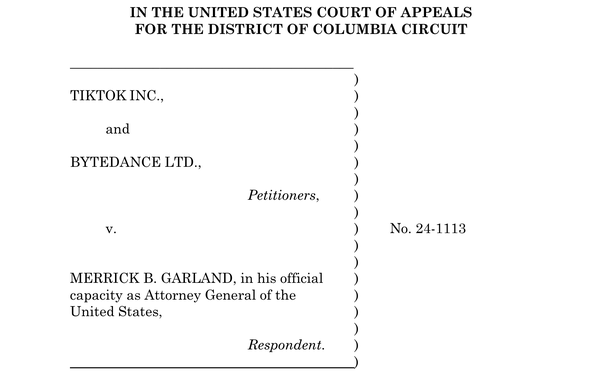
TikTok sued Tuesday to
invalidate a new law that will ban the app nationwide unless it's sold within one year by China-based parent company ByteDance.
“For the first time in history, Congress has enacted a law
that subjects a single, named speech platform to a permanent, nationwide ban, and bars every American from participating in a unique online community with more than 1 billion people worldwide,”
TikTok and its parent company say in a petition filed with the Circuit Court of Appeals for the D.C. Circuit.
TikTok and ByteDance are seeking a declaratory judgment that the law is
unconstitutional on several grounds, including that it violates the First Amendment right to freedom of expression and the Fifth Amendment right to due process of law.
The suit comes two weeks
after President Joe Biden signed the Protecting Americans From Foreign Adversary Controlled Applications Act, which prohibits web hosting services and app marketplaces from distributing TikTok, unless
it's sold within one year by ByteDance.
advertisement
advertisement
Lawmakers who supported the
measure expressed concerns that the Chinese government would be able to obtain data from TikTok about Americans, and that Chinese Communist Party would use the app to spread propaganda. Some lawmakers
also suggested that information received through classified
briefings justified the ban.
Immediately after Biden signed the law, TikTok CEO Shou Chew vowed to challenge it in court.
TikTok and ByteDance say in the petition that unless
the law is blocked, it will inevitably result in a ban because divestment “is not commercially, technologically, or legally feasible.”
“A substantial part of TikTok’s
appeal is the richness of the international content available on the platform -- from global sporting events like the Olympics to international K-pop stars from South Korea, as well as videos created
by U.S. creators and enjoyed by audiences worldwide,” the companies argue.
They add that divestment “would preclude the interoperability necessary to make international content
seamlessly available in the U.S. market and vice versa.”
The companies argue that allowing the new law to go into effect would violate TikTok's rights to free speech, as well as the
rights of its users.
“Congress has made a law curtailing massive amounts of protected speech,” the companies say. “Unlike broadcast television and radio stations, which
require government licenses to operate because they use the public airwaves, the government cannot, consistent with the First Amendment, dictate the ownership of newspapers, websites, online
platforms, and other privately created speech forums.”
They also claim that Congress passed the law based on speculative concerns.
“Congress itself has offered nothing to
suggest that the TikTok platform poses the types of risks to data security or the spread of foreign propaganda that could conceivably justify the Act,” the companies write.”
Digital rights advocates opposed the new law, arguing that banning a communications platform is unconstitutional.
“Users of TikTok in the United States have a First Amendment right to
receive information,” including videos, art and news items posted by other TikTok users, Kate Ruane, director of the Center for Democracy & Technology's Free Expression Project, told
MediaPost last month.
That right “cannot be restricted on the basis of speculative risks,” she added.
Last year, TikTok successfully challenged a Montana law that would have banned the app
in that state.
U.S. District Court Judge Donald Molloy in Missoula said in that matter that the law likely violated the First Amendment, writing that the statute wasn't “narrowly
tailored” to preventing China from obtaining data about Americans.
Montana is currently appealing that ruling to the 9th Circuit Court of Appeals.